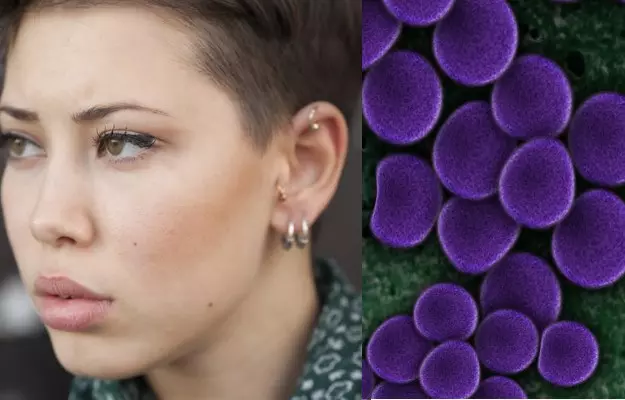Self-care is the best way to prevent and reduce infections associated with an ear piercing. When followed properly, these techniques also eliminate the need for over the counter medicines or a visit to a doctor.
Touch me not
The first and foremost thing to limit the infection is by following a no-touch rule. It's totally understandable that you are concerned about the wound and in such case, the mind tends to drag all the attention towards the point of concern. However, following your mind is not a good idea here. Touching the infected wound will promote the spread of bacteria through your hands to the pierced ear, causing infection. It will also worsen the infection if you already have acquired one. So, it's wise to have some control over your hand and let the wound heal on its own.
Clean the infected site
Only a clean and hygienic piercing site will promote healing in the most natural way possible. So, it is best to take extra care for keeping your ear and piercing clean. While bathing, use a liquid soap or shower gel to clean the piercing site. This will help wash away some of the bacteria and dead cells and promote wound healing. If the piercing has developed pus, make sure to clean the discharging pus from time to time. Here is an easy way to clean the pus from the infected ear:
What you’ll need:
- A cotton bud or a clean soft towel or a tissue
Procedure:
- Gently swipe the cotton or tissue over the pus to collect it and wipe it off
- Try not to touch it with bare hands while you are doing so
- If it is leaking constantly you can try draining it a bit, though avoid putting extra pressure since it may lead to pain
Essential oils
To stimulate healing at the infected side the total bacterial load in that area needs to drop. One of the best ways to do it is by application of essential oils.
Essential oils contain active volatile substances, which possess antimicrobial and anti-inflammatory properties. These oils not only help in eradicating infectious microorganisms, but they also decrease susceptibility of further infection in the open wound and promote skin regeneration.
Few essential oils which are beneficial in healing wound infections caused by ear piercings are tea tree oil, lavender oil and oregano oil. These oils have been scientifically proven to be effective in reducing the growth of pathogenic bacteria like Streptococcus and Pseudomonas, which are the most common causes of piercing infections. To get the best possible pharmacological effects of essential oils, you need to apply these oils topically on the infection site in the following way.
What you’ll need:
- The essential oil of your choice
- A sterile cotton bud
Procedure:
- Put a few drops of essential oil onto the cotton bud
- Apply it on the wound
- You need to do this a few times a day until the wound starts to reduce in size
Tip: Not all essential oils are safe to be used directly on the skin, some may lead to irritation. So, it is best to dilute the oil with some amount of carrier oil to make a 2% solution.
Eat foods rich in vitamin C
Nourishing yourself from inside is as important as any topical application to prevent or treat health conditions, specifically infections. Amongst the various macro and micronutrients, vitamins C plays an important role in maintaining our immune responses. It promotes the formation of immune system cells so that your body can actively fight against infections.
Furthermore, collagen (a skin protein) makes the framework for wound healing and for collagen production you need to provide your body with vitamin C. So, for rapid wound healing, vitamin C becomes one of the essential precursors.
Include food sources rich in vitamin C like citrus fruits in your diet to get all of these benefits from this micronutrient. You can also take vitamin C supplements to compensate the deficiency; however, it is always best to check in with a doctor before taking any kind of supplements as most of our needs are usually compensated by the food we eat.
Eat green leafy vegetables and fresh fruits for other essential nutrients required for wound healing like vitamin A, zinc and copper.
Warm compress
This may sound wrong to use for an infected wound like ear piercing. However, studies have proven that warm compress helps in delivering heat to the wound site, thereby increasing the blood circulation locally and increased infiltration of immune system cells.
You can use any cotton cloth to make your own warm compress at home.
What you’ll need:
- A cotton cloth
- Warm water
Procedure:
- Dip the cloth in water
- Clean the infected area gently with it
- After cleaning, mildly compress the wound site with a warm wet cloth to stimulate healing
- Make sure the water is warm enough but not too hot as it may cause burns
You can also add sea salt in the water for the additional benefits. Salt is a natural disinfectant, it helps suppress the growth of infectious microbes and promotes wound healing.



























